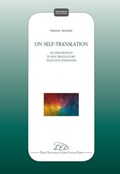The book explores aspects of self-translation, an all but exceptional phenomenon which has been practised, albeit on the quiet, for nearly two thousand years and has recently grown exponentially due to the increasing internationalisation of English and the growing multilingualism of modern societies. Starting from the premise that self-translation is first and foremost a translational act, i.e. a form of rewriting subject to a number of constraints, the book utilises the most valuable methods and findings of translation studies to account for the variety of reasons underlying self-translation processes and the diversity of strategies used by self-translators. The cases studied, from Kundera to Ngugi, and addressing writers like Beckett, Huston, Tagore, Brink, Krog and many others, show that the translation methods employed by self-translators vary considerably depending on their teloi. Nonetheless, most self-translations display domesticating tendencies similar to those observed in allograph translations, which confirms the view that self-translators, just like normal translators, are never free from the linguistic and cultural constraints imposed by the recontextualising of their texts in a new language. Most interestingly, the study brings to light certain recurring features, e.g. a tendency of author-translators to revise their original during the self-translation process or after completing it, which make self-translators privileged authors who can revise their texts in the light of the insights gained while translating.

